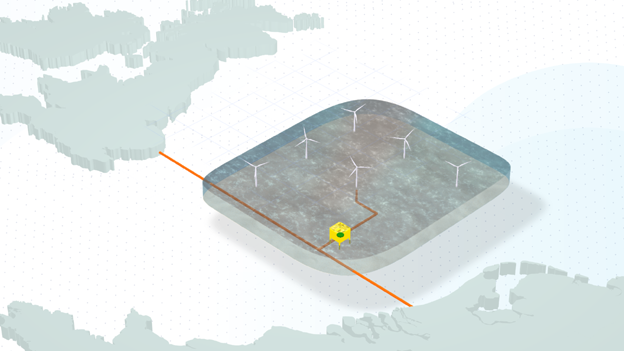- LionLink power line between UK and Netherlands will deliver enough electricity to power more homes than Manchester and Birmingham combined
- Agreement made as Grant Shapps leads delegation of leading businesses to key North Sea Summit
- Part of renewed Government drive to work with business to help grow the economy

The world’s largest multi-use electricity power line will be built under the North Sea, boosting UK energy supplies with enough to power 1.8 million homes – more than Birmingham and Manchester combined.
The new LionLink will connect the UK and the Netherlands with offshore wind farms, providing clean affordable and secure energy to Britain which will help cut household bills and drive Putin’s Russia further out of the energy market.
The cross-border electricity line will be only the second of its kind in the world, with the first having been built by Germany and Denmark. However, it will be able to carry more than four times the amount of electricity as its predecessor – making it the largest of its kind in terms of capacity anywhere in the world.
While normal interconnectors only connect two countries, the multipurpose LionLink will join the UK and Netherlands to each other as well as simultaneously with offshore wind farms at the heart of the North Sea.
The government is announcing the innovative project between the UK and the Netherlands as Energy Security Secretary Grant Shapps leads a British business delegation to the crucial North Sea Summit in Belgium today, aiming to boost our collective energy security through new renewable energy and interconnector projects.
This is part of the government’s efforts to work with business to grow the economy, one of the Prime Minister’s five priorities. Boosting clean energy not only helps create better paid jobs across the country but also strengthens economic security by reducing reliance on foreign gas supplies.
The summit will see nine countries meet in Ostend to agree ambitions for building future offshore wind farms. While there, the Energy Security Secretary is also expected to sign a historic agreement with Denmark to boost trade in cheaper, cleaner energy.
Energy Security Secretary Grant Shapps said:
“Today’s historic deal with the Netherlands connects our two countries together through this exciting feat of innovation and engineering - the largest of its kind in the world which will provide enough electricity for more homes than in Manchester and Birmingham combined.
“Together with the strong ties we have with our northern European neighbours united today at the North Sea Summit, we are bolstering our energy security and sending a strong signal to Putin’s Russia that the days of his dominance over global power markets are well and truly over.
“I’m proud to have the best of UK energy firms and organisations with me, flying the flag for British business and demonstrating our world-leading expertise in cleaner, cheaper and secure renewable technologies - helping deliver on one of our five priorities to grow the economy.”
Ben Wilson, President National Grid Ventures, said:
“Connecting wind farms to multiple markets simultaneously is a game changer for energy infrastructure and brings us one step closer to realising the enormous green energy potential of the North Sea.
“Not only can we deploy every spare electron where it is needed most, we can help to reduce the impact of infrastructure on coastal communities.
“We now need the right political, legal and regulatory framework to make it happen and establish a mutually beneficial North Sea grid to deliver a cleaner, fairer, more secure and more affordable energy future for British and European consumers.”
The countries attending today’s summit alongside the UK are Belgium, Denmark, France, Germany, Ireland, Luxembourg, Norway and the Netherlands.
The new LionLink will carry 1.8GW of electricity, compared to Germany and Denmark’s Kassø-Frøslev (Kriegers Flag), which carries 0.4GW. It will be developed by National Grid Ventures and TenneT and will be operational by the early 2030s.
This builds on the 8.4GW interconnector capacity that the UK has – and LionLink alone will increase that by up to a fifth, meaning more clean and affordable power for UK homes and businesses.
This increased interconnectivity also means LionLink will be good both for the UK’s coastal communities and the environment by reducing the need for further onshore construction and visible infrastructure, as well as lessening the impact on the North Sea's wildlife.
Britain’s world-class innovation, knowledge and skills within the North Sea energy sector is expected to bring £20 billion a year of investment to the UK’s coastal regions and create 40,000 skilled green jobs to Britain.
Manon van Beek, CEO of TenneT, said:
“It is our conviction that offshore hubs configured in a meshed DC grid must form the backbone of the North Sea powerhouse.
“This is a view that is increasingly shared, and for us, it is more than a vision of the future.
“In fact, we are already doing it by kicking off this ground-breaking LionLink project right now. It is a first step and a great opportunity to learn as the offshore grid takes shape.”
The Energy Security Secretary is also expected to sign a Memorandum of Understanding between the UK and Denmark today, which will ensure further collaboration on the transition from fossil fuels to renewable technologies –offshore wind, especially.
Minister Rob Jetten, Climate & Energy for the Netherlands:
“With the North Sea becoming the largest supplier of green electricity for the Netherlands and large parts of Europe, we are ready to expand the interconnection between the two countries. LionLink provides close to 2 gigawatts of electricity to both countries, enough to power 2 million households.
“This new connection further boosts energy security and energy independence in Europe. Close collaboration on offshore wind energy and interconnection amongst the North Sea countries is imperative.
“So in case there is a surplus of wind generated electricity, it can be shared instantly to locations with a shortage of power, and vice versa.”
KeyFacts Energy Industry Directory: TenneT
 KEYFACT Energy
KEYFACT Energy